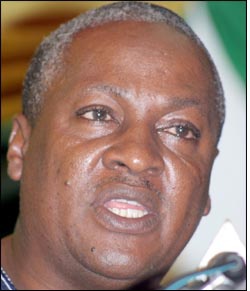The vice president, who was Ghana’s former minister of communications, said he thought about the posting all night and all he could think was “Well, this young person is absolutely right,” said Mahama in an interview at a Mayflower Hotel suite, where he was staying during the Washington leg of his nine-day U.S. visit.
Mahama’s trip came just days before first lady Michelle Obama’s five-day tour this week of sub-Saharan Africa, which will focus on HIV/AIDS projects and helping young adults on the world’s poorest continent.
Mahama was in Washington to meet with leaders at the World Bank, the IMF, the Bill and Melinda Gates Foundation, and the Millennium Challenge Corp. (MCC), an independent U.S. foreign aid agency created in 2004 by Congress to bring “smarter” aid and development to fight global poverty.
Ghana is Africa’s newest oil producer, and one reason Mahama came to the United States was to meet with energy companies and tout his country as a destination for U.S. businesses. “Africa is crawling with Chinese and Brazilian and Indian businessmen looking for opportunities to invest,” he said, adding that it’s time for American corporations to follow suit.
For many Africans, Mahama is engaged in a way that few heads of state are. His actions contradict the cliched idea of the Big Man African dictator who clings to power and jails journalists, and is unresponsive, isolationist and, on average, over 70 years old.
Mahama is 52, answers e-mail from citizens directly and tweets. He also writes often and lyrically for a daily online magazine, the Root (owned by The Washington Post). In his widely read June 9 essay, Mahama chronicles the legacy of Fela Kuti, the Nigerian Afrobeat singer. Mahama wrote about how Kuti’s music might have been inspired by Africa’s outburst of democracy.
Mahama is also an author, having written a forthcoming and critically praised collection of short stories titled “My First Coup d’Etat. And Other True Stories from the Lost Decades of Africa.” “Nobody is too old to go onto the Internet,” he said in his hotel room, where a Ghanaian American cook had brought in trays of waakye (boiled rice and beans with tomatoes and chili pepper), along with banku (fermented corn dough), pepper sauce and tilapia.
“Sometimes, wonderful contributions come on your Facebook. Somebody makes a post and it clicks some idea in your mind and you think, bingo, you can resolve some important issues for your people.” Within weeks of receiving the Facebook post on the Ghana Water Company Limited, Mahama was holding news conferences recommending that his country decentralize water, which he predicted would help the health of citizens and the economy.
At the World Bank, Mahama put the finishing touches on a zero interest loan of $100?million to Ghana, which will begin in July, said Herbert Boh, World Bank senior communications officer for Africa. The money will be used to develop Ghana’s northern region to bring more commercial agriculture and employment for youth in the historically marginalized region, where there is a 63 percent poverty rate, compared with about a 28 percent rate in the South, Boh said.
General News of Wednesday, 22 June 2011
Source: Washington Post
Washington Post on John Mahama

















